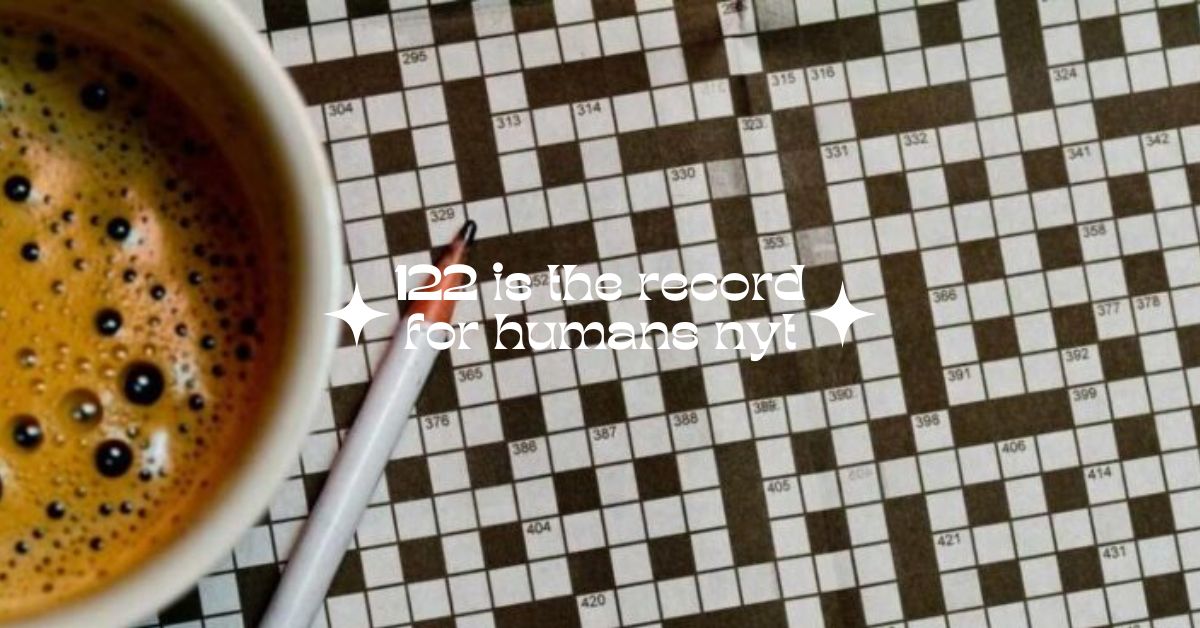122 is the record for humans nyt – What You Need to Know!
After years of solving puzzles, I was thrilled to hear that 122 is the record for humans in the NYT Crossword. I remember my heart racing as I tried to beat my own best time, but I could never match that amazing record. It inspired me to keep practicing and improving my skills, knowing that one day I might get closer to that incredible mark!
The record of 122 seconds for solving the NYT Crossword is an incredible achievement for human solvers. Set by Dan Feyer in 2017, this record shows how fast and skilled crossword enthusiasts can be. If you’re looking to improve your own solving time, studying tips and strategies can help you get closer to this amazing benchmark!
We will talk about the exciting achievement of 122 seconds, which is the record for humans in the NYT Crossword. We’ll explore the story behind this remarkable feat and share tips on how you can improve your own solving skills. Join us as we dive into the world of crossword puzzles and discover what it takes to reach this incredible benchmark!
What does “122 is the record for humans” mean?
The phrase “122 is the record for humans” means that the fastest time anyone has solved a New York Times Crossword puzzle is 122 seconds. This amazing achievement shows just how quick and skilled some puzzle solvers can be. It was set by Dan Feyer, who completed a Monday puzzle in just over two minutes.
Most people take about 30 minutes to finish the same puzzle, making this record even more impressive. The record inspires many crossword enthusiasts to improve their solving skills. It’s a reminder that with practice and dedication, anyone can get better at solving puzzles!
Who set the 122-second record?
The 122-second record for solving the New York Times Crossword was set by a talented solver named Dan Feyer. He achieved this incredible time on April 7, 2017. Dan is well-known in the crossword community for his fast solving skills and deep knowledge of puzzles. Completing a Monday crossword in just 122 seconds is no small feat, as it typically takes most people about 30 minutes to finish.
His record inspires many crossword fans to practice and improve their own solving times. Dan’s achievement shows that with hard work and dedication, anyone can reach amazing goals. He has become a role model for those who love crossword puzzles!
Is 122 seconds a good time for solving the NYT Crossword?
Yes, 122 seconds is an amazing time for solving the New York Times Crossword! Most people take around 30 minutes to finish a Monday puzzle, which is usually the easiest of the week. Dan Feyer, who set this record, completed it in just over two minutes, showing his incredible skills. This record is a benchmark for many crossword enthusiasts who aim to improve their speed.
It highlights how much practice and knowledge can help in solving puzzles quickly. While it might be hard to match this time, it inspires others to keep trying and getting better. So, if you love crosswords, know that aiming for a fast time is a great goal!
What type of puzzle was solved in 122 seconds?
The puzzle solved in 122 seconds was a New York Times Crossword puzzle, specifically a Monday puzzle. Monday puzzles are known to be the easiest of the week, making them a good starting point for many solvers. Despite being easier, completing one in just over two minutes is still an impressive achievement.
This shows how skilled Dan Feyer is at solving crosswords quickly. His record demonstrates that even the easiest puzzles can be solved at lightning speed with practice and experience!
How can I improve my crossword-solving speed?
- Practice Regularly: The more you solve puzzles, the better you’ll get. Try to work on crosswords every day or week
- Learn Common Clues: Familiarize yourself with frequently used words and clues. Many puzzles repeat the same types of questions.
- Start with Easy Clues: Begin by filling in the clues you know well. This will help you get a strong foundation for solving the rest of the puzzle.
- Use Crossword Apps: Many apps offer daily puzzles and tips for improvement. They can also help track your solving times.
- Think of Word Patterns: As you fill in letters, look for patterns that can help you guess other words quickly.
- Work on Speed: Time yourself while solving puzzles. This will help you identify where you can improve and push your limits.
- Stay Calm and Focused: Don’t rush too much. Staying calm will help you think clearly and solve clues more efficiently.
Does the NYT Crossword get harder throughout the week?
Yes, the New York Times Crossword puzzles generally get harder as the week goes on. On Monday, the puzzles are the easiest, making them great for beginners. They usually have simpler clues and more common words.
As the week progresses, the puzzles become more challenging. By Saturday, they can be quite difficult, often requiring advanced knowledge and creative thinking.
Sunday puzzles are also hard but usually longer, combining both easy and tricky clues. This pattern helps solvers gradually improve their skills. If you’re a beginner, starting with the Monday puzzles is a good idea before tackling the harder ones later in the week!
What other records are there in the world of crosswords?
In the world of crosswords, there are several interesting records besides the 122-second solving time. One notable record is the largest crossword puzzle ever created, which had over 28,000 clues! Another record is for the most puzzles solved in one hour, where some solvers completed more than 10 puzzles.
There’s also a record for the fastest crossword puzzle completion by a team, showcasing how teamwork can lead to amazing results. Some puzzles have unique themes or formats, like cryptic crosswords, which challenge solvers in different ways.
Can anyone break the 122-second record?
Yes, it’s possible for someone to break the 122-second record for solving the NYT Crossword! Many crossword enthusiasts are always trying to improve their skills and speed. With practice and dedication, solvers can become faster and more accurate. New techniques and strategies can help, and the competition among top solvers keeps pushing the limits.
Some solvers already have exceptional skills, so they might be able to beat this record in the future. However, breaking such a fast time is very challenging and requires a lot of hard work. It will be exciting to see if anyone can achieve this amazing feat!
Are there any tips for beginners to solve crosswords?
- Start with Simple Puzzles: Begin with easier puzzles, like those in newspapers or beginner apps, to build your confidence.
- Read the Clues Carefully: Take your time to understand what each clue is asking. Look for keywords that might hint at the answer.
- Fill in Known Answers First: Start with clues you are sure about. This will give you a foundation to work from.
- Look for Common Words: Familiarize yourself with words that frequently appear in crosswords, like “era” or “ore.”
- Use Pencil or Eraser: If you’re solving on paper, use a pencil so you can easily change answers if needed.
- Don’t Be Afraid to Guess: Sometimes it’s okay to take a guess, especially if you have a few letters filled in. You can always come back to it later.
- Practice Regularly: The more you practice, the better you’ll become. Try to solve a puzzle daily or weekly.
- Ask for Help: If you’re stuck, don’t hesitate to ask friends or use online resources to find tips and strategies.
Why is solving crosswords good for your brain?
Solving crosswords is great for your brain for several reasons. First, it helps improve your vocabulary by introducing you to new words and phrases. Second, it boosts your memory as you recall information and clues from past puzzles.
Third, solving crosswords encourages critical thinking, as you need to figure out how words fit together. Additionally, it enhances problem-solving skills by challenging you to find answers creatively. Regularly doing crosswords can also keep your mind sharp and focused.
FAQs
What makes the New York Times Crossword special?
The New York Times Crossword is known for its high quality, clever clues, and gradual increase in difficulty throughout the week. It attracts many solvers, from beginners to experts.
How do crossword puzzles benefit mental health?
Solving crosswords can reduce stress and anxiety by providing a fun and engaging way to focus your mind. It can also boost confidence as you improve your skills.
What are some common clues found in crosswords?
Common clues include abbreviations, wordplay, and cultural references. Familiar phrases and popular names are often used to challenge solvers.
Can I create my own crossword puzzles?
Yes! There are online tools and apps that allow you to create your own crossword puzzles. It can be a fun way to share your interests with others.
Conclusion,
crossword puzzles offer a stimulating and enjoyable way to engage the mind while providing numerous cognitive benefits. The record of 122 seconds for solving a New York Times Crossword highlights the impressive skills of dedicated solvers and inspires others to improve their abilities. Whether you’re a beginner or an experienced solver, crosswords challenge your vocabulary, memory, and problem-solving skills, making them a valuable mental exercise.






